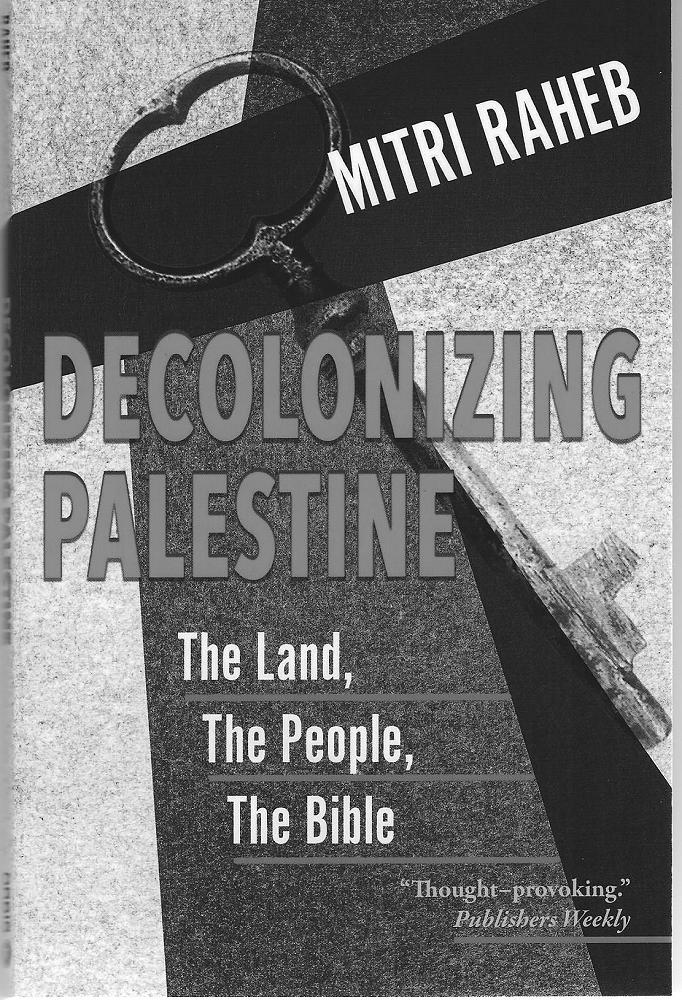
DECOLONISING PALESTINE…The Land, The People, The Bible
Author: Mitri Raheb Publisher: Orbis Books, 2023, 166 pages. Reviewer: Brian Turner
The most compelling conclusion of this very readable book is how the ‘settler colonialism’ imposed on Palestinians by the State of Israel is maintained by liberal Christian Zionists together with the support of the Western ‘Anglo-Saxon’ empire.
Mitri Raheb is a Palestinian Christian and President of Dar al-Kalima University in Bethlehem. He writes first hand of what settler colonialism means in his own backyard of the ‘Bethlehem Governate’ where he lives and works and of the increasing loss of land, liberty and livelihood for his fellow indigenous Palestinians.
But of course Raheb paints the larger historical and contemporary impact of settler colonialism: of how the United Nations Partition Plan of 1947 was meant to safeguard the security and land of Palestinians as well as Israelis but the latter quickly evicted 750,000 Palestinians and destroyed 452 of their villages. Today, the minority of Palestinians remaining in Israel are considered second-class citizens which has led a number of international human rights organisations to describe Israel as an apartheid state. The remaining Palestinians are confined to the West Bank where there is increasing Israeli settler incursion and to Gaza where over two million Palestinians are confined by Israel but ruled internally by Hamas.
Quoting instances from South Africa, North America and Australasia, Raheb notes that permanent settler colonialists “establish and enforce state sovereignty and juridical control over the indigenous land, ultimately aiming to eliminate the native people. The natives become extraneous whilst the settlers are cast as natives through different political mechanisms, ideological constructs and social narratives”.
For the State of Israel, these narratives include a heavy dependence on the Jewish Scriptures notably the book of Joshua which portrays and justifies the Israelites’ historic conquest of Canaan-Palestine. This biblical narrative, and its underlying emphasis on the Jews as God’s chosen people acquiring a promised land, is used to justify today’s State of Israel and its increasing ethnic cleansing of Palestinians. This underlying sense of privilege and superiority defines Zionism which takes both Jewish and Christian forms of expression.
What is surprising in Raheb’s portrayal of Zionism is that it’s not confined to Jewish and Christian fundamentalists but has systematically infected many liberal Christian theologians and scholars including Karl Barth, Paul van Buren and Walter Brueggemann. The last named (under whom I spent one study leave) appears to Raheb to flip flop a bit but in a 2015 publication by Brueggemann which Raheb quotes extensively, Brueggemann connects “the biblical promise of the land with the notion of ‘God’s chosen people’” and then goes on to claim that the State of Israel is “an embodiment of God’s chosen People”. All of which leads Raheb to portray Brueggemann as a leading liberal Christian Zionist along with others who misuse scripture in a similar manner.
The concept of ‘God’s chosen people’ as purely Jewish has always struck me as at odds with Jesus who went freely to Samaritans and others and is portrayed in Mathew’s gospel as entreating His disciples to go into all the world (Matthew 28:19).
Predictably, not all the world has endorsed the State of Israel, but Raheb notes that countries that have practised settler colonialism extensively, notably Britain and America, express virtually unqualified support for the State of Israel. Britain historically led the way and America’s contemporary military aid ensures the State of Israel remains firmly within what Raheb describes as the “Anglo-Saxon world” and “Empire”.
Raheb notes the hypocrisy in the West blasting Russia for its invasion of Ukraine but turning a blind eye at the increasing encroachment of Israel on Palestinian territory.
Raheb concludes that “Palestine presents a real
challenge to the credibility of the entire western world, a world that has not yet come to terms with the ramifications
of its own colonial heritage”.
